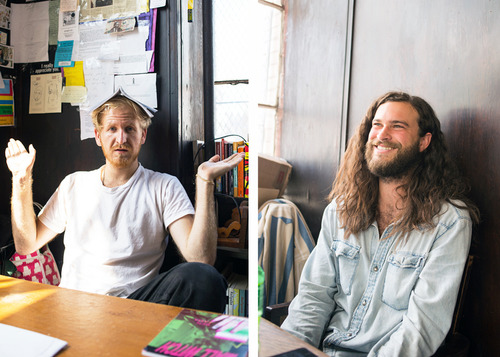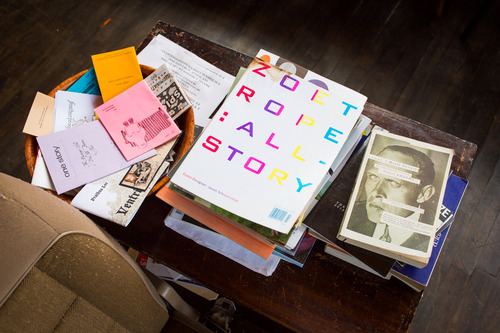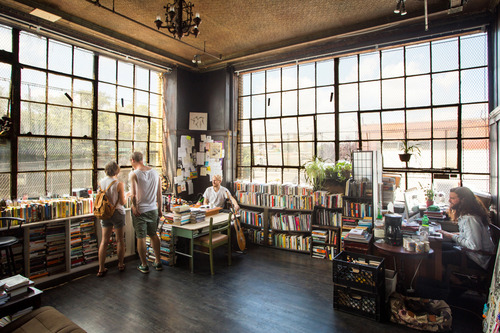
Photos of Matt Nelson (left) and Jacob Perkins by Cameron Blaylock.
Brooklyn has long been literary turf, but until a few years ago, writers wandering its industrial Bushwick neighborhood were likely seeking solitude. The area attracted hundreds of visual artists but lacked even a single bookseller. Reading series, a writers’ collective and four used bookstores gradually tucked in near art galleries and cafes; then in February 2013, the tiny Mellow Pages opened, in a small art studio. A tribe of about 300 readers, writers and fans quickly grew into a community who share their chapbooks, zines, extra coffee, beer and old furniture. Within four months, the small-press-focused free library upgraded into a stunning light-filled corner studio more than twice the size. I stopped by recently to talk with 26-year-old founders Jacob Perkins and Matt Nelson about the library…and, uh, my overdue book.
—Robin Grearson
I. Painting was too expensive
THE BELIEVER: How did Mellow Pages start?
JACOB PERKINS: Matt and I had the idea for a while and didn’t really have enough money or any means to make it happen. We had been collaborating on different stuff and the idea of a library had come up a lot.
BLVR: Collaborating?
JP: We wrote a bunch of these… they were called 50-50s. We designed a system of folding a paper so we could create poems from the inside out. We wanted to start something that was a place. I had this art studio, but I had pretty much stopped physically using the room. I was making art on the computer instead of painting physically, ‘cause it was too much money for material. So the space was kind of available. And we were out drinking one night and it was the middle of winter. Matt was like, I think I’m gonna move back to Seattle. I was like, wait, we could do something. And it kind of clicked in this moment. I had gone down to North Carolina and rescued all these books that my brother had there, from grad school.
BLVR: Rescued? Where was your brother?
JP: Portland. He had been at Duke, moved away and left all his stuff there. I came back with a rental car and, like, three to four hundred books that were all pretty tightly curated philosophy and political theory. That night we went out and were like, we should start the thing here, ’cause we had enough books, including Matt’s books and my books. We had absolutely no plan. We hadn’t thought of all of the systems for memberships or checking out or online cataloguing. Even after we opened, we were still figuring things out.
BLVR: How many days a week do you have events?
JP: On average three. But this week, five. We get emails every day from people who want to use the space, which is what we’re here for.
BLVR: Do you remember who donated book number one, aside from Jacob’s brother?
JP: Yeah. Definitely. Eric Nelson. About a week before we opened, he came in and brought his little chapbook, The Walt Whitman House [from Brooklyn’s The Crumpled Press]. We didn’t know him at the time, now he’s one of our good friends. He also gave us a ton of people to reach out to before we opened. Karina Briski helped, who had done stuff for Electric Literature. We had the opening party on February 21, and there were a ton of people there.
BLVR: The library grew quickly: has your plan changed at all? Do you wish you were selling things? Or, are you?
JP: No. We want to keep everything as free as it is. The idea is generally just sharing and free books. We’re gonna try to do a fundraiser, because although we don’t want to introduce profit, we still need money. ‘Cause we just fund it ourselves.
MN: When money’s involved, the act of recommending a book or a wine or a shirt becomes in at least the smallest way more about your livelihood. You may believe in the quality of the work or the possible positive effects it will have on the consumer, but always there is a little bit of you as the seller involved. And we didn’t want to get bogged down with that personal element. When we want you to read a book, there is no other reason than we want you to read a book.
BLVR: So what do you tell people when they want to buy a book?
JP: Nothing’s for sale. I find myself saying that a lot. Especially to strangers. We have a sign outside and people will wander in, just curious what it is. And they’re, like, oh, a bookstore. And I’m like, no, it’s actually a library, nothing’s for sale. But if I wanted to buy this, how much would it be? Nope, it’s not for sale. We only have one copy of everything. Maybe a third of the books that we have currently are on loan to us, so they aren’t our books. That’s how you check out books. You become a member by loaning 10 of your books to us, which stay here. Other members can check them out. So it’s completely free.
BLVR: What books do you ask for or request or — is there a wish list?
JP: Yeah, we have a wish list on our Goodreads page. Our general wish list is small press books or independently pressed books, or zines, chapbooks, things that aren’t connected to a press. That is what we hope to fill the whole room with at a certain point. People made the collection what it is, and it’s probably one of the best small press collections on the East Coast. So many of those books you can only buy online, or from the actual writer. We don’t have everything. But from the last couple years, we have a lot of it. And you can’t find that stuff in stores, and that’s cool.
BLVR: What other libraries or free collections do you know of like this one?
MN: Not only are hotels hiring people now to curate libraries, but there are places like the Alternative Library in Bellingham, ABC No Rio Zine Library right in Manhattan, the Hugo House’s zine library in Seattle—at least when I left they still had it—Poet’s House, the Notebook Library in Williamsburg, and OWS.
BLVR: What’s one of your earliest librarian memories?
JP: My elementary school librarian. I was in second grade, and she was pretty old and really crotchety. She would be really mean, probably ’cause she just didn’t want to have to deal with us and our library cards and little kids checking out books and losing them. But then she would read us a children’s book, and she was always really nice and awesome during those times. So I didn’t understand whether it was because there was a teacher overseeing the little reading group. When I would go alone and try to check out a book, she would be really mean, like, “You can’t check that out.”

II. Hey, if you want to share that…
BLVR: I have a book that’s been out for a long time.
JP: We email people. We have emailed you and reminded you about this.
BLVR: No! I haven’t gotten anything.
JP: How long has your book been out?
BLVR: Four weeks.
JP: Four weeks? Oh, no. Every month or two we’ll go through and see who’s late.
BLVR: What is late? No one gave me a due date.
JP: It’s not like we’re gonna email you right away. It depends on when we look through things. We try to run on trust, mainly. So we just make people feel guilty. If they’ve had a book for a long time it’s like, hey, if you want to share that, you know, like everyone else does, then you can. [Laughing]
BLVR: What are you reading right now?
JP: Dan Magers, a poet, had an event here. He was like, you have to meet Andy Mister and you have to take his book, it’s coming out soon. Dan read a copy six years ago and said it completely influenced his writing. So I started reading and it’s really good. It’s pretty depressing and really kind of bleak but it almost reads like a music critic’s writing. There’s a lot about different musicians and their lives and overdoses and suicides. And mixed in will be thoughts from the narrator, and you make all these connections between these types of people that the book is talking about. It’s fucked up. But it’s super good. That is what I’m currently reading. Liner Notes, by Andy Mister.
MN: We used to have my copy of David Foster Wallace’s Oblivion, which is a blind spot in most people’s readings of Wallace. But I bought another copy because I love that book. “Good Old Neon” is pretty close to hitting my every nerve. So that’s what I’m reading. And then Marie Calloway’s book next.
BLVR: How are the books arranged?
JP: Well at one time, they were arranged in no way. Recently we got some cool shelves that I found. So we have separated at least small press from large press stuff. The small press stuff is either [displayed] on the wall or organized by the press of origin, although not in alphabetical order. It’s pretty organized. It’s not color-coded or anything. We’ve been trying to help people a little bit. But that’s the fun.
BLVR: What happens when someone comes in looking for a specific title?
JP: We’re not trying to help people find the right book. [LAUGHING] We can look in our catalog, yeah, we have it: Find it. But our real purpose is for the small press stuff, so we’re doing that. Mildly organized.
BLVR: Is there anything written by you or Matt here?
JP: Matt had a poem in [Brooklyn reading series] The Highwaymen chapbook with a lot of other people we know. That’s somewhere in here. I have something in a journal called Exit Strata, which my friend Lynn makes. We’ve published a lot of things online but neither of us has books. Yet. Someday.
BLVR: I think you told me before, that people in other cities want to do this, too. Has anyone?
JP: Paper Darts, a Minneapolis-based blog, came into possession of this space for one month. They contacted us, wanted to do a pop-up. That was when I was like, when people contact us for our advice, why don’t we just make this guide, and people can do it on their own. The idea wasn’t to be incorporated and have this system of libraries in a bunch of different cities. But having a larger community does seem cool. As far as overseeing multiple locations or something, we would do it but that’s not, like, a goal, to [LAUGHING] spread out and conquer. We’re paying for everything so we can’t do that. Yet, if other people want to start them, we would be really excited and helpful. And before people even asked, we just wanted to help spread the idea.
BLVR: Why?
JP: Why? Well, before we started, we didn’t know if anyone would care or if it would work or anything. And then it did, and a lot of people cared, and it seemed like, well, if we’re doing this here in New York, it’s probably one of the harder places to pull it off. There’s a lot of people, but money-wise and life-wise, it’s hard. So we wanted to just give people a guide of how we did it. Depending on what city you’re in, it’s probably a lot easier to do it where you are. Like, we don’t have any special expertise or anything going for us that made it easier for us to do it. Some people are like, this is so cool. I wish this was in my city. It was this statement of—you can do it. That’s why we did it, ’cause it wasn’t there.
BLVR: Is Mellow Pages part of something you brought with you, or is it a New York thing? For instance, New Yorkers make fun of me for giving tourists directions and tell me I’m not a “real New Yorker.”
JP: I’m from Portland and Matt’s from Seattle. And people are always like, so where’s the profit? What’s the deal? And we’re like, oh, nothing. It’s free, and that’s how we want it to be. And people are always saying, you’re so Pacific Northwest. They can’t even understand—like, what? Why? I hope that’s not just a Pacific Northwest thing. I don’t think it is, but I think some people think that we brought whatever we brought with us from somewhere else. Maybe they’re right.
BLVR: Have you thought about the library as a political action?
JP: I think it definitely is a type of statement, whether or not that was the idea beforehand. We had this experiment that we tried. The reaction is what was politically interesting, I think. Once we made this, we realized there’s a lot of people who want things like this, but who believe things like this can’t exist.
BLVR: This makes me think of the Occupy Wall Street library, did any of those books end up here?
JP: Yeah, they’ve just shown up. We’ve had people who are more involved with that who have come in because they like the idea. And those people need a place to have their literature as well, and we’re totally open to that. Matt and I aren’t really affiliated with any kind of Occupy movement. We’re definitely not opposed, we just weren’t involved in any way.
BLVR: If you create a library that brings like-minded people together to share literature, it empowers people.
JP: They did it in Zuccotti Park, they had a library. And it was created by the people, for the people, and you could have anything there. And that is a great thing. I don’t know if that was in my mind when we were starting this, but it comes to mind now. You need places like that.
BLVR: What percentage of people join by giving you $20 instead of donating 10 books?
JP: There might be four people per month that join by giving us money.
BLVR: Most people are giving you books.
JP: Yeah, almost everyone. That’s why if we were to change anything about the way we deal with memberships and our business, it wouldn’t work. If you had to pay, people just wouldn’t use it. It wouldn’t even be a useful thing. Because no one has money. So the fact that we allow people to donate books and share for free, that’s what the idea is. Otherwise it just wouldn’t exist.
BLVR: But people should still buy books they like, too.
JP: Oh yeah. So many people have checked out a book here and decided to buy it afterward. The amount of checkouts that have led to purchases within the small press stuff, number wise, it’s probably not a huge amount, but the fact that it’s here and people are checking it out is already great. And if it leads to a sale, that’s almost beyond the point. The writers just want readership, and that spreads.
BLVR: Make a prediction. You outgrew the first space in about four months. When do you see Mellow Pages outgrowing this space?
JP: I don’t know. It’s gonna take, I’ll say at least one year. Because there’s a lot we can do in here as far as continuing to get creative with stacking and getting more book-related furniture to build up the wall or whatever. At least a year. We’ve got plenty of room right now.

Robin Grearson is a freelance writer and member of Mellow Pages who lives in Brooklyn. Her borrowed copy of The Flamethrowers is technically not overdue, but she is returning it soon anyway, so she can borrow Dan Magers’ Party Knife.
See more about Mellow Pages via their guide on How to Start a User-Sourced Library/Reading Room on HTMLGIANT.
See their current funding project on Indiegogo.
Photos by Cameron Blaylock.




